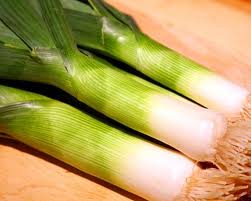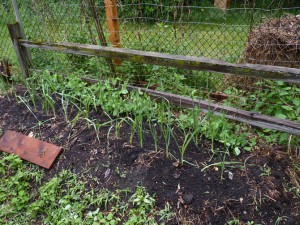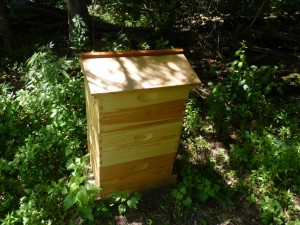Beltane New Last Frost Moon
The potatoes are in the ground. The lettuce has two leaves, as does the spinach, a few beets have emerged. The leeks look a bit droopy, but they’ll pick up. The garlic is well over 6 inches now as it makes the final push for harvest in late June, early July. None of the carrots have germinated yet and most of the beets have not either. The onion sets we planted have mostly begun to show green. The bees show up now around the property, working as we do, tending the plants in their own, intimate way. The gooseberries we transplanted look very healthy. The daffodils are a carpet of yellow and white. A few scylla out front brighten up the walk with their blue.
mostly begun to show green. The bees show up now around the property, working as we do, tending the plants in their own, intimate way. The gooseberries we transplanted look very healthy. The daffodils are a carpet of yellow and white. A few scylla out front brighten up the walk with their blue.
Most of today went into Diana and Actaeon. I’m down to verse 227, the finish line is 250. I’m close and moving faster now than I was. One of the things I’ve learned is that doing this at a pace which would allow you to complete a project in a reasonable time frame would require real skill. I’m a hobby Ovidist, to be a Latin scholar would take decades. Who knows though? I might make it. When I finish this first tale in the Metamorphosis, I’m going to have some kind of celebration.
Buddy Mark Odegard has come up with three remarkable designs for a Free Ai Weiwei t-shirt. Here’s an example and the one most seem to prefer:

 Asparagus? We’ve got green things above ground, not far above ground, with the exception of the mighty rhubarb, but we have germination and lift out.
Asparagus? We’ve got green things above ground, not far above ground, with the exception of the mighty rhubarb, but we have germination and lift out. keep on growing, too, also up in the hydroponics once they become youngsters and not babies, but they will go in the ground outside as soon the ground can be worked. (I think. May be a bit later.) Over February, March and April other plants will follow the same process, growing up to two leaves, then getting transferred to the nutrient baths of the hydroponics. Each one, in its own time, will go outside to the waiting beds. They will augment the garlic, the strawberries, the raspberries, the asparagus already growing there.
keep on growing, too, also up in the hydroponics once they become youngsters and not babies, but they will go in the ground outside as soon the ground can be worked. (I think. May be a bit later.) Over February, March and April other plants will follow the same process, growing up to two leaves, then getting transferred to the nutrient baths of the hydroponics. Each one, in its own time, will go outside to the waiting beds. They will augment the garlic, the strawberries, the raspberries, the asparagus already growing there. winter, but delighted. I’d understand if only two made it, but I’d be disappointed with one. I’ve got a long ways to go before I’m a good bee-keeper, but I have years to go before I sleep. Time enough.
winter, but delighted. I’d understand if only two made it, but I’d be disappointed with one. I’ve got a long ways to go before I’m a good bee-keeper, but I have years to go before I sleep. Time enough.